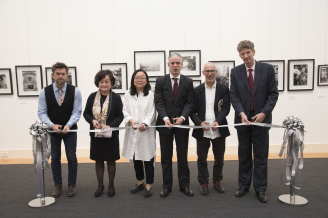Media
Bosshard in China: Documenting Social Change in the 1930s
captures the tumult of the 1930s through historical photographs and films
26 Apr 2018

The Generalissimo and Mrs Chiang Kai-shek listening to Dr Sven Hedin speak about his journey to Sinkiang.
Walter Bosshard
Hankou, February 1935.
The University Museum and Art Gallery (UMAG) of the University of Hong Kong (HKU) will present Bosshard in China: Documenting Social Change in the 1930s from April 27 to August 5, 2018. Bosshard in China offers a comprehensive sweep of black and white photographs and documentary films produced by Swiss photo-journalist Walter Bosshard. Living and traveling extensively in China from 1933 to 1939, Bosshard was one of the earliest journalists to record this critical decade in Chinese and world history.
An opening ceremony of the exhibition was held at UMAG today (April 26). Officiating guests included Consul General of Switzerland in Hong Kong and Macau Reto Renggli, Director and Curator of the Swiss Foundation of Photography Peter Pfrunder, Vice-Chairman of the HKU Museum Society Anna Ann Yeung and UMAG Director Florian Knothe.
The exhibition is organised into thematic sections that give insight into the photographer’s mind as he traversed myriad landscapes and social conditions, from Beijing to Lake Qinghai in western China; from the bombing of Hankou to Mongolian shepherds on the steppe. Apart from filming daily life, Bosshard also photographed and interviewed key political figures, including Mao Zedong in Yan’an, Chiang Kai-shek and Soong Mei-ling, Madame Chiang Kai-shek.
Following earlier exhibitions at UMAG of Magnum photographers and their oeuvres in the West, Bosshard in China documents China’s landscape and its people during a time when China was undergoing significant sociopolitical upheaval. During this same era, photojournalism was developing into a serious mass medium of information, and Bosshard’s work in the 1930s was one of the primary means by which the Far East came to life across living rooms in Europe and America.
As Bosshard’s journeys through China are well documented, his imagery offers valuable contextual information. He provides views into a society—and now past—that benefits from the objective view of the camera lens. Bosshard’s work is of historical significance, as most Western photographers only went to China for individual assignments, but did not live there for extended periods. Many of the Chinese photographers were politically engaged or had been commissioned, which resulted in a more selective subject matter and consistent narrative.
Bosshard’s documentary photography and film are neither colonialist nor otherwise politically motivated. Though he lived alongside the Chinese people during the Japanese invasion, he did not take sides but rather let his images—both still and moving—capture the scenes unfolding around him. This phenomenon is remarkable, as traditional reports of political and military campaigns, and especially images of warfare, often aimed to communicate either nationalist or anti-nationalist sentiments. Bosshard documented urban centres and rural regions, peaceful everyday as well as wartime activities, and throughout all of these moments he strived to remain a neutral observer. His oeuvre presents a more holistic view of a country that was perceived internationally as highly important but altogether remained little known.
For more images and captions of the exhibits, please click here.
Details of the Exhibition
Period: April 27, 2018 (Friday) to August 5, 2018 (Sunday)
Opening Hours:
09:30 – 18:00 (Monday to Saturday)
13:00 – 18:00 (Sunday)
Closed on University and Public Holidays
Venue: 1/F T.T. Tsui Building, UMAG, HKU, 90 Bonham Road, Pokfulam
Tel/Email: (852) 2241 5500 (General Enquiry) / museum@hku.hk
Admission: Free
Website: http://www.umag.hku.hk/en/
Connect with UMAG on social media:
Facebook: https://www.facebook.com/umag.hku
Twitter: https://twitter.com/UMAG_HKU
Instagram: #WalterBosshard, #photographs, #documentaryfilms, #UMAG
Weibo: @香港大學美術博物館UMAG
About University Museum and Art Gallery of the University of Hong Kong (UMAG)
UMAG was founded in 1953 as the Fung Ping Shan Museum. It was originally established as the Fung Ping Shan Library in 1932 in honour of its benefactor. For more information on UMAG, please click here.
Media enquiries
UMAG Senior Communications Officer Ms Elena Cheung, Tel: (852) 2241 5512, Email: elenac@hku.hk
UMAG Programme Assistant Ms Chelsea Choi, Tel: (852) 2241 5509, Email: cchelsea@hku.hk
(From left) Ribbon-cutting ceremony by UMAG Curator and Publisher Christopher Mattison, Vice-Chairman of the HKU Museum Society Anna Ann Yeung, Co-Founder and Co-Director of Lianzhou Museum of Photography Duan Yuting, Consul General of Switzerland in Hong Kong and Macau Reto Renggli, Director and Curator of the Swiss Foundation of Photography Peter Pfrunder and UMAG Director Florian Knothe.




